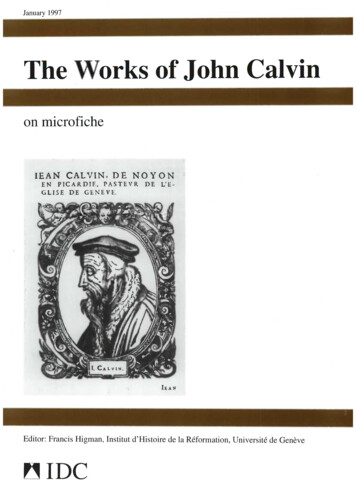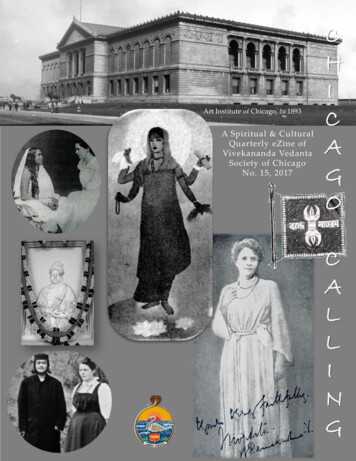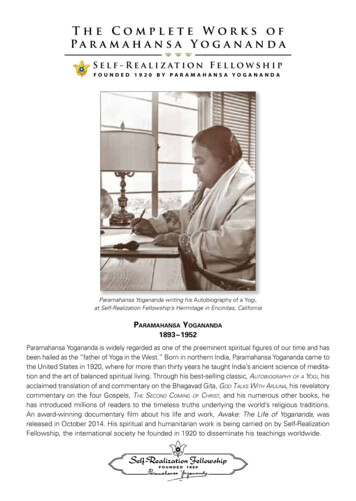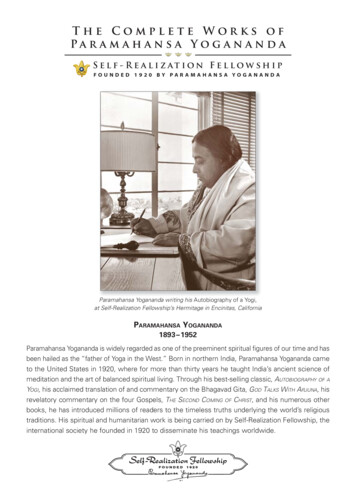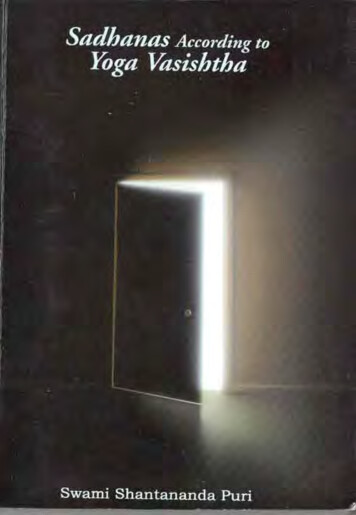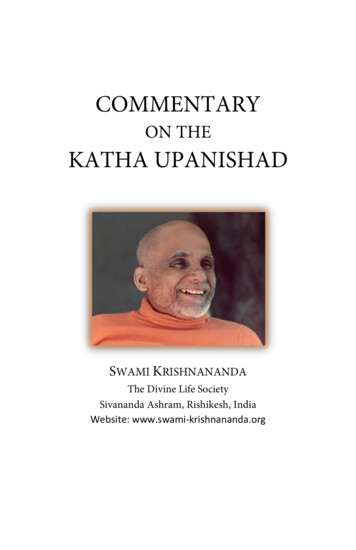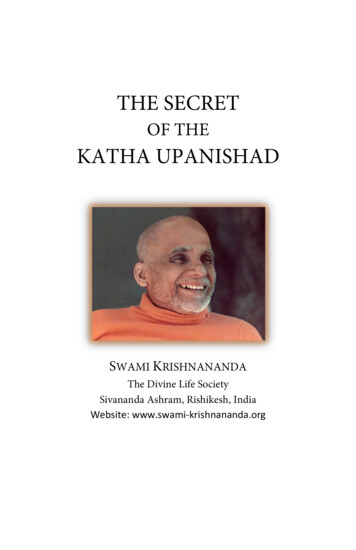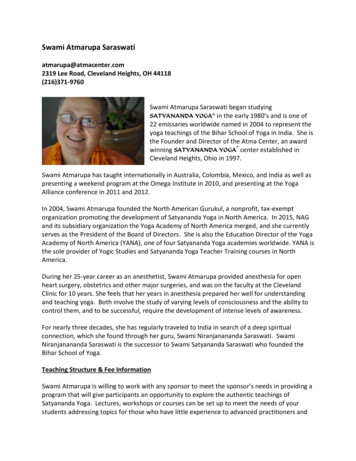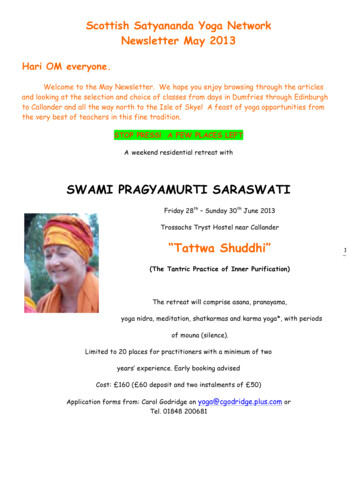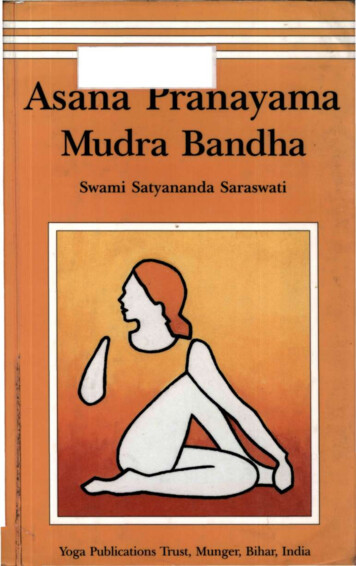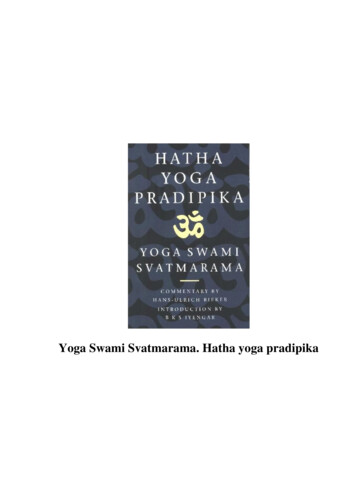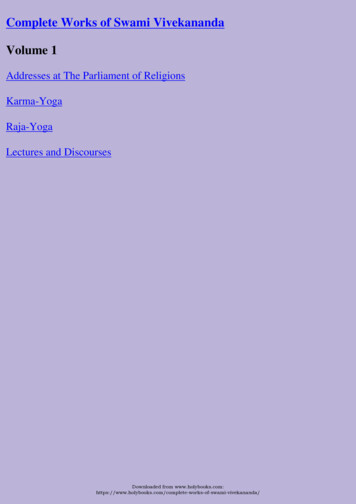
Transcription
Complete Works of Swami VivekanandaVolume 1Addresses at The Parliament of ReligionsKarma-YogaRaja-YogaLectures and DiscoursesDownloaded from te-works-of-swami-vivekananda/
Downloaded from te-works-of-swami-vivekananda/
Complete Works of Swami VivekanandaVolume 1Addresses at The Parliament of ReligionsResponse to WelcomeWhy We DisagreePaper on HinduismReligion not the Crying Need of IndiaBuddhism, the Fulfilment of HinduismAddress at the Final SessionDownloaded from te-works-of-swami-vivekananda/
Home / Complete-Works / Volume 1 / Addresses at The Parliament of Religions/ RESPONSE TO WELCOMEAt the World's Parliament of Religions, Chicago11th September, 1893Sisters and Brothers of America,It fills my heart with joy unspeakable to rise in response to the warm andcordial welcome which you have given us. I thank you in the name of the mostancient order of monks in the world; I thank you in the name of the mother ofreligions; and I thank you in the name of millions and millions of Hindu peopleof all classes and sects.My thanks, also, to some of the speakers on this platform who, referring to thedelegates from the Orient, have told you that these men from far-off nationsmay well claim the honour of bearing to different lands the idea of toleration. Iam proud to belong to a religion which has taught the world both tolerance anduniversal acceptance. We believe not only in universal toleration, but we acceptall religions as true. I am proud to belong to a nation which has sheltered thepersecuted and the refugees of all religions and all nations of the earth. I amproud to tell you that we have gathered in our bosom the purest remnant of theIsraelites, who came to Southern India and took refuge with us in the very yearin which their holy temple was shattered to pieces by Roman tyranny. I amproud to belong to the religion which has sheltered and is still fostering theremnant of the grand Zoroastrian nation. I will quote to you, brethren, a fewlines from a hymn which I remember to have repeated from my earliestboyhood, which is every day repeated by millions of human beings: “As thedifferent streams having their sources in different places all mingle their waterin the sea, so, O Lord, the different paths which men take through differenttendencies, various though they appear, crooked or straight, all lead to Thee.”The present convention, which is one of the most august assemblies ever held,is in itself a vindication, a declaration to the world of the wonderful doctrinepreached in the Gita:“Whosoever comes to Me, through whatsoever form, IDownloaded from te-works-of-swami-vivekananda/
reach him; all men are struggling through paths which in the end lead to me.”Sectarianism, bigotry, and its horrible descendant, fanaticism, have longpossessed this beautiful earth. They have filled the earth with violence,drenched it often and often with human blood, destroyed civilisation and sentwhole nations to despair. Had it not been for these horrible demons, humansociety would be far more advanced than it is now. But their time is come; andI fervently hope that the bell that tolled this morning in honour of thisconvention may be the death-knell of all fanaticism, of all persecutions with thesword or with the pen, and of all uncharitable feelings between personswending their way to the same goal. Downloaded from te-works-of-swami-vivekananda/
Home / Complete-Works / Volume 1 / Addresses at The Parliament of Religions/ WHY WE DISAGREE15th September, 1893I will tell you a little story. You have heard the eloquent speaker who has justfinished say, "Let us cease from abusing each other," and he was very sorrythat there should be always so much variance.But I think I should tell you a story which would illustrate the cause of thisvariance. A frog lived in a well. It had lived there for a long time. It was bornthere and brought up there, and yet was a little, small frog. Of course theevolutionists were not there then to tell us whether the frog lost its eyes or not,but, for our story's sake, we must take it for granted that it had its eyes, and thatit every day cleansed the water of all the worms and bacilli that lived in it withan energy that would do credit to our modern bacteriologists. In this way itwent on and became a little sleek and fat. Well, one day another frog that livedin the sea came and fell into the well."Where are you from?""I am from the sea.""The sea! How big is that? Is it as big as my well?" and he took a leap from oneside of the well to the other."My friend," said the frog of the sea, "how do you compare the sea with yourlittle well?”Then the frog took another leap and asked, "Is your sea so big?""What nonsense you speak, to compare the sea with your well!""Well, then," said the frog of the well, "nothing can be bigger than my well;there can be nothing bigger than this; this fellow is a liar, so turn him out."Downloaded from te-works-of-swami-vivekananda/
That has been the difficulty all the while.I am a Hindu. I am sitting in my own little well and thinking that the wholeworld is my little well. The Christian sits in his little well and thinks the wholeworld is his well. The Mohammedan sits in his little well and thinks that is thewhole world. I have to thank you of America for the great attempt you aremaking to break down the barriers of this little world of ours, and hope that, inthe future, the Lord will help you to accomplish your purpose. Downloaded from te-works-of-swami-vivekananda/
Home / Complete-Works / Volume 1 / Addresses at The Parliament of Religions/ PAPER ON HINDUISMRead at the Parliament on 19th September, 1893Three religions now stand in the world which have come down to us from timeprehistoric — Hinduism, Zoroastrianism and Judaism. They have all receivedtremendous shocks and all of them prove by their survival their internalstrength. But while Judaism failed to absorb Christianity and was driven out ofits place of birth by its all-conquering daughter, and a handful of Parsees is allthat remains to tell the tale of their grand religion, sect after sect arose in Indiaand seemed to shake the religion of the Vedas to its very foundations, but likethe waters of the seashore in a tremendous earthquake it receded only for awhile, only to return in an all-absorbing flood, a thousand times more vigorous,and when the tumult of the rush was over, these sects were all sucked in,absorbed, and assimilated into the immense body of the mother faith.From the high spiritual flights of the Vedanta philosophy, of which the latestdiscoveries of science seem like echoes, to the low ideas of idolatry with itsmultifarious mythology, the agnosticism of the Buddhists, and the atheism ofthe Jains, each and all have a place in the Hindu's religion.Where then, the question arises, where is the common centre to which all thesewidely diverging radii converge? Where is the common basis upon which allthese seemingly hopeless contradictions rest? And this is the question I shallattempt to answer.The Hindus have received their religion through revelation, the Vedas. Theyhold that the Vedas are without beginning and without end. It may soundludicrous to this audience, how a book can be without beginning or end. But bythe Vedas no books are meant. They mean the accumulated treasury ofspiritual laws discovered by different persons in different times. Just as the lawof gravitation existed before its discovery, and would exist if all humanityforgot it, so is it with the laws that govern the spiritual world. The moral,ethical, and spiritual relations between soul and soul and between individualDownloaded from te-works-of-swami-vivekananda/
spirits and the Father of all spirits, were there before their discovery, and wouldremain even if we forgot them.The discoverers of these laws are called Rishis, and we honour them asperfected beings. I am glad to tell this audience that some of the very greatestof them were women. Here it may be said that these laws as laws may bewithout end, but they must have had a beginning. The Vedas teach us thatcreation is without beginning or end. Science is said to have proved that thesum total of cosmic energy is always the same. Then, if there was a time whennothing existed, where was all this manifested energy? Some say it was in apotential form in God. In that case God is sometimes potential and sometimeskinetic, which would make Him mutable. Everything mutable is a compound,and everything compound must undergo that change which is calleddestruction. So God would die, which is absurd. Therefore there never was atime when there was no creation.If I may be allowed to use a simile, creation and creator are two lines, withoutbeginning and without end, running parallel to each other. God is the everactive providence, by whose power systems after systems are being evolved outof chaos, made to run for a time and again destroyed. This is what the Brâhminboy repeats every day: "The sun and the moon, the Lord created like the sunsand moons of previous cycles." And this agrees with modern science.Here I stand and if I shut my eyes, and try to conceive my existence, "I", "I","I", what is the idea before me? The idea of a body. Am I, then, nothing buta combination of material substances? The Vedas declare, “No”. I am a spiritliving in a body. I am not the body. The body will die, but I shall not die. Heream I in this body; it will fall, but I shall go on living. I had also a past. The soulwas not created, for creation means a combination which means a certain futuredissolution. If then the soul was created, it must die. Some are born happy,enjoy perfect health, with beautiful body, mental vigour and all wants supplied.Others are born miserable, some are without hands or feet, others again areidiots and only drag on a wretched existence. Why, if they are all created, whydoes a just and merciful God create one happy and another unhappy, why is Heso partial ? Nor would it mend matters in the least to hold that those who aremiserable in this life will be happy in a future one. Why should a man beDownloaded from te-works-of-swami-vivekananda/
miserable even here in the reign of a just and merciful God?In the second place, the idea of a creator God does not explain the anomaly, butsimply expresses the cruel fiat of an all-powerful being. There must have beencauses, then, before his birth, to make a man miserable or happy and thosewere his past actions.Are not all the tendencies of the mind and the body accounted for by inheritedaptitude? Here are two parallel lines of existence — one of the mind, the otherof matter. If matter and its transformations answer for all that we have, there isno necessity for supposing the existence of a soul. But it cannot be proved thatthought has been evolved out of matter, and if a philosophical monism isinevitable, spiritual monism is certainly logical and no less desirable than amaterialistic monism; but neither of these is necessary here.We cannot deny that bodies acquire certain tendencies from heredity, but thosetendencies only mean the physical configuration, through which a peculiarmind alone can act in a peculiar way. There are other tendencies peculiar to asoul caused by its past actions. And a soul with a certain tendency would by thelaws of affinity take birth in a body which is the fittest instrument for thedisplay of that tendency. This is in accord with science, for science wants toexplain everything by habit, and habit is got through repetitions. So repetitionsare necessary to explain the natural habits of a new-born soul. And since theywere not obtained in this present life, they must have come down from pastlives.There is another suggestion. Taking all these for granted, how is it that I do notremember anything of my past life ? This can be easily explained. I am nowspeaking English. It is not my mother tongue, in fact no words of my mothertongue are now present in my consciousness; but let me try to bring them up,and they rush in. That shows that consciousness is only the surface of themental ocean, and within its depths are stored up all our experiences. Try andstruggle, they would come up and you would be conscious even of your pastlife.This is direct and demonstrative evidence. Verification is the perfect proof of aDownloaded from te-works-of-swami-vivekananda/
theory, and here is the challenge thrown to the world by the Rishis. We havediscovered the secret by which the very depths of the ocean of memory can bestirred up — try it and you would get a complete reminiscence of your past life.So then the Hindu believes that he is a spirit. Him the sword cannot pierce —him the fire cannot burn — him the water cannot melt — him the air cannotdry. The Hindu believes that every soul is a circle whose circumference isnowhere, but whose centre is located in the body, and that death means thechange of this centre from body to body. Nor is the soul bound by theconditions of matter. In its very essence it is free, unbounded, holy, pure, andperfect. But somehow or other it finds itself tied down to matter, and thinks ofitself as matter.Why should the free, perfect, and pure being be thus under the thraldom ofmatter, is the next question. How can the perfect soul be deluded into the beliefthat it is imperfect? We have been told that the Hindus shirk the question andsay that no such question can be there. Some thinkers want to answer it bypositing one or more quasi-perfe
the Vedas no books are meant. They mean the accumulated treasury of spiritual laws discovered by different persons in different times. Just as the law of gravitation existed before its discovery, and would exist if all humanity forgot it, so is it with the laws that govern the spiritual world. The moral, ethical, and spiritual relations between soul and soul and between individual Downloaded .

